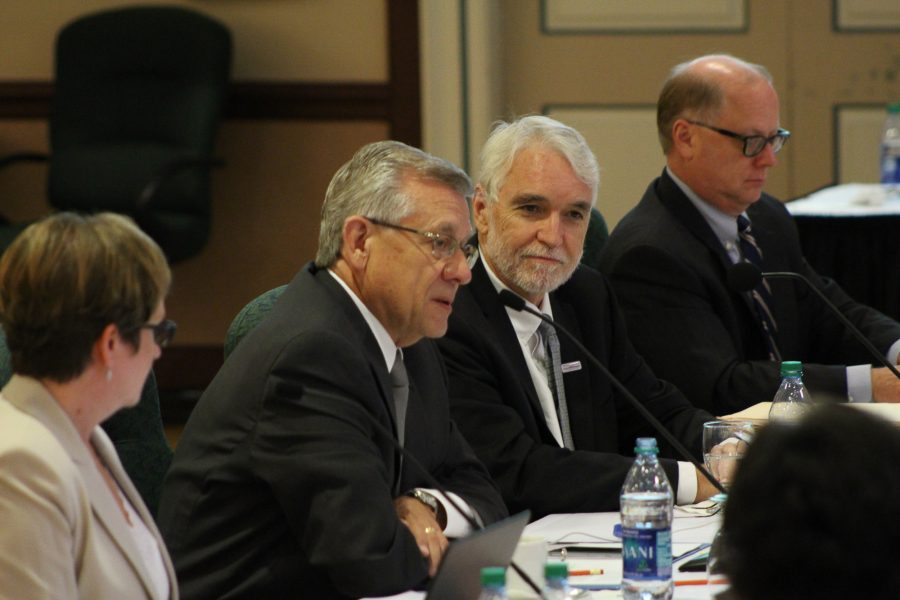University caucus to unveil state funding bill
Chairman of the Board Edward L. Macmillan and UIUC president attend the Board of Trustees meeting at the Illini Union on Thursday, Sept. 8, 2016.
Nov 2, 2016
University President Timothy Killeen will unveil a bill at next Thursday’s Board of Trustees meeting that would award money from the state to the University if it meets target goals.
Dubbed the Investment Performance and Accountability Initiative, the bill would exchange money for metrics with the hope of providing the University with stable state funding. The bill is expected to be filed Nov. 10, and it will be a U of I caucus initiative.
“Well as you’ve noticed, it’s been a year-to-year uncertainty that’s crept in with the budget and that’s very difficult to plan and execute a high-performing approach to a public institution of this complexity and excellence,” Killeen said. “So we would like to get a more predictable envelope on our budget so we can plan and implement in a more considerate, effective fashion instead of jumping from crisis to crisis, which has been the situation for the last couple years.”
Killeen and Jennifer Creasey, the University’s director of state relations, remained quiet on the details ahead of next week’s formal announcement at the Board of Trustees meeting, where members of the caucus will be in attendance. Rep. Michael Zalewski and Sen. Bill Cunningham are leading the initiative, according to Creasey.
“I don’t want to get ahead of that rollout, but basically it would just be a new relationship with the state and a partnership of the flagship, land grant university of how we could work with the state and have the state invest in us, then we live up some high standards set by the state to better represent the people of Illinois,” Creasey said.
Get The Daily Illini in your inbox!
Killeen has spoken to Gov. Bruce Rauner about the legislation and has spoken “extensively” to a number of legislators. Rep. Michael Zalewski, a Democrat representing the 96th district, will sponsor the bill in the House. He is optimistic the bill will pass despite the gridlock in Springfield.
“I would argue that any bill right now that has bipartisan support and provides for a long-term solution stands a better chance than other bills,” he said. “When I say that, I mean we are in the midst of a difficult policy period in Illinois where we are having hard time coming to grips with what we want to do as a state. So we need to think creatively and think outside the box on certain issues, and I think this proposal the University’s putting forth falls into those categories, so I’m optimistic we can come to an agreement on it.”
The University will advocate for the bill in addition to full funding from the state. It has ramped up its lobbying efforts since the state budget crisis began.
Illinois Connection, the Alumni Association’s advocacy network, coordinates University of Illinois Day, where students or alumni meet with legislators at the Capitol and attend meetings with lawmakers in their districts, according to Courtney Grussing, board operations coordinator. In August, Illinois Connections partnered with the office of governmental relations to hold a legislative connections breakfast in Peoria.
The Network manages student advocacy groups at each of the University’s campuses. Students will participate in a letter-writing campaign next week, meet with the U of I caucus later this semester and lead a social media campaign geared toward the general assembly in January.
Though some students are already involved, Creasey wants to engage more students and faculty this year. Her goal is to create a portal by January for them to sign up to meet with lawmakers in Springfield in small groups each Wednesday when Congress is in session.
She thinks the new strategy would help make the University’s case because students and faculty are the ones dealing with the effects of the budget crisis.
“And I think to get them to tell our story is much more beneficial than having me, paid staff or someone,” she said. “So the people, the constituency, to put a face on what this budget crisis is really doing and to show legislators that they care to sacrifice their time to come to the Capitol to talk to them because it is important.”
Even with the addition of students and faculty, the University will continue to rely on voices such as Killeen. Creasey commended his work, saying he has a “constant presence” in the Capitol.
It will also enlist help from alumni in the Capitol. There are 15 state senators and 31 state representatives serving in the U of I caucus, though that number could change with the election next week.
Once the election is over, Creasey said, the University will again start budget talks with the state.






